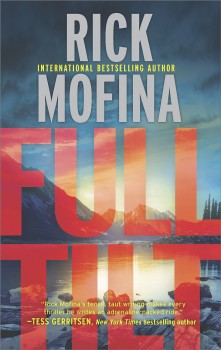Full Tilt by Rick Mofina
 By Basil Sands
By Basil Sands
Does crime pay? Rick Mofina might say yes. He has been making his living writing about it since he sold his first short story to a magazine at age fifteen. During college he walked in Hemingway’s shoes as a rookie reporter for The Toronto Star launching a career in journalism that spanned three decades. He’s been face-to-face with murderers on death row, covered a horrific serial killing case in California, an armored car heist in Las Vegas, and the murders of police officers in Alberta. He’s flown over Los Angeles with the LAPD, and gone on patrol with the Royal Canadian Mounted Police near the Arctic. And he’s reported from the Caribbean, Africa, and Middle East. All of it helped prepare him for his work as a successful crime novelist.
Today we’re here to talk about his latest novel FULL TILT.
Rick, please tell us a little about FULL TILT.
FULL TILT is the second book in the new series featuring Kate Page, a reporter with a global wire service based in New York City. Kate was orphaned as a child and had a hard life. But she’s a fighter and a survivor. We find Kate, now a single mom, working in Manhattan, when she receives a heart-stopping call from a detective. A guardian angel charm found at a horrific crime scene fits the description of the one belonging to Kate’s sister, Vanessa, who washed away after a car crash in a mountain river twenty years ago. Kate has spent much of her life searching for the truth behind her little sister’s disappearance. Now Kate is faced with one last chance to either mourn Vanessa’s death—or save her life.
How do you come up with the story lines you write?
I like to start with a “seed of ‘reality,’” to help shape a story. A larger part of my news reporting experience involved working the police beat. It put me face-to-face with the best and worst of the human condition. I was expected to write about it, to make some sense out of horrible incidents that made no sense at all, then present it in a story to readers on deadline. Sadly, the true horrors that happen everywhere every day seldom end well, if they end at all. This is something I bear in mind in writing crime fiction. I try to apply the fundamental code of most crime fiction, which is the restoration of order to chaos. And I try to start with a ‘grain of truth,’ to build on a solid foundation for a compelling story, from there I’ll apply the “what if,” this happened element, and off we go.
What drew you into a life of journalism?
I went into journalism to gain experience. I started in news in the 1980s at The Toronto Star before moving on. During that time, it took me several years to understand what I wanted, or needed, to write about. I had written and abandoned a few novels. Then one day, reluctantly, I was assigned to my newspaper’s police beat. Unless you’ve done this kind of work, nothing prepares you for it. You see what cops, paramedics, firefighters, and emergency experts see. For me, as a reporter by day, novelist by night, a light had been switched on. Covering human tragedies and dramas up close was overwhelming. But on another level, having a university degree in English Literature, Journalism, and having studied religious responses to death and American Detective Fiction, I felt I was equipped to try to make sense of what I was experiencing. To try to convey through fiction, the truths I’d learned. That’s how I came to write my first book, If Angels Fall, which was published by Pinnacle of New York in 2000. It’s still available online as an eBook.
Can you share with us a memorable story from that career?
I had many strange experiences as a reporter. One quiet night I was working alone in the newsroom on the cop beat when a call came in for me. It was a convicted murderer who was calling from the prison’s psych ward. I didn’t know him, but I had written about him and he told me he’d read my stories. That night he confessed to me how he tricked his way to get access to a telephone because he needed to talk to somebody outside of the institution. So, I said, talk. He then went into every detail, every vile, disgusting detail, of how he abducted two young women then held them hostage in a suburban home. Then he told me exactly how he murdered one but decided to let the other live. He was not remorseful, or even emotional. He just wanted me to have a clear accounting. Then he hung up. My spine rattled for hours after. I had trouble sleeping that night. That’s only one strange experience from the beat.
Do you have a particular process to your writing? Any rituals or methods you use to get focused?
I need to be fully awake. Mornings are best for me.
If you could go back in time and give yourself a piece of advice regarding your writing life what would you tell yourself?
On those dark nights when the self-doubt is overwhelming, I’d say, just keep at it. Keep working.
And now we come to the part of the interview where we the reader can delve deep into your psyche and learn something about the very soul of Rick Mofina. You’re out late with friends. After a great meal and several drinks you find yourself in need of the micturation facilities (ie. gotta go tinkle). Upon completion of said mission, whilst washing your hands, a voice calls out from behind you. You turn to discover very short, very hairy man holding open a stall door.
He motions urgently to you and says in a heavy Irish accent, “Come on Richard! We’ve got to stop them!”
Glancing past the strange little man you see that rather than a toilet and pipes, there is a staircase going down to a dark tunnel, a deep thrum pulses rhythmically in the distance. What do you do next?
Return to my table order another drink then call Clive Barker and Stephen King and say, nice try but I ain’t fallen for it.
*****
 Rick Mofina is a former journalist who has reported from the Caribbean, Africa and Kuwait’s border with Iraq. His books have been published in nearly 30 countries. The Crime Writers of Canada, The International Thriller Writers and The Private Eye Writers of America have listed his titles among the best in crime fiction. He is a three-time Thriller Award nominee and a two-time Shamus Award nominee.
Rick Mofina is a former journalist who has reported from the Caribbean, Africa and Kuwait’s border with Iraq. His books have been published in nearly 30 countries. The Crime Writers of Canada, The International Thriller Writers and The Private Eye Writers of America have listed his titles among the best in crime fiction. He is a three-time Thriller Award nominee and a two-time Shamus Award nominee.
To learn more about Rick, please visit his website.
- Lou Berney - September 21, 2023
- Spotlight: Charles Soule - June 24, 2023
- The Magdalene Deception by Gary McAvoy - July 31, 2020
